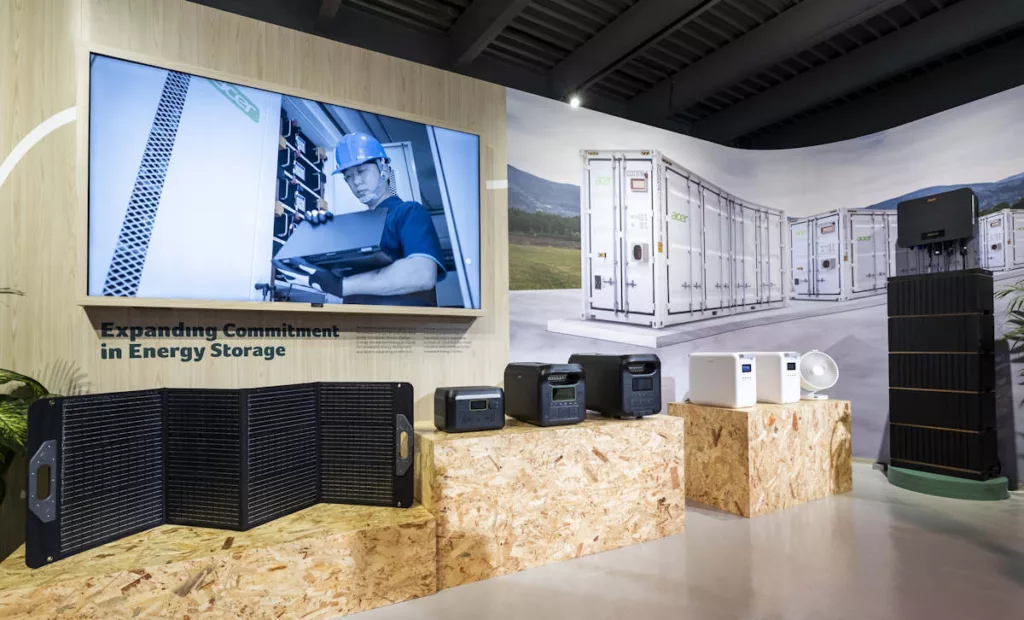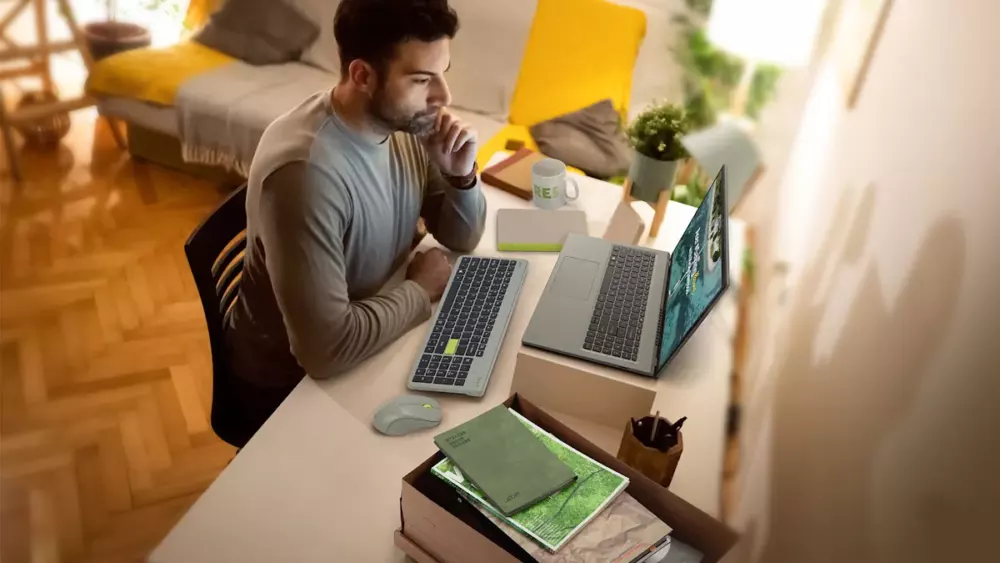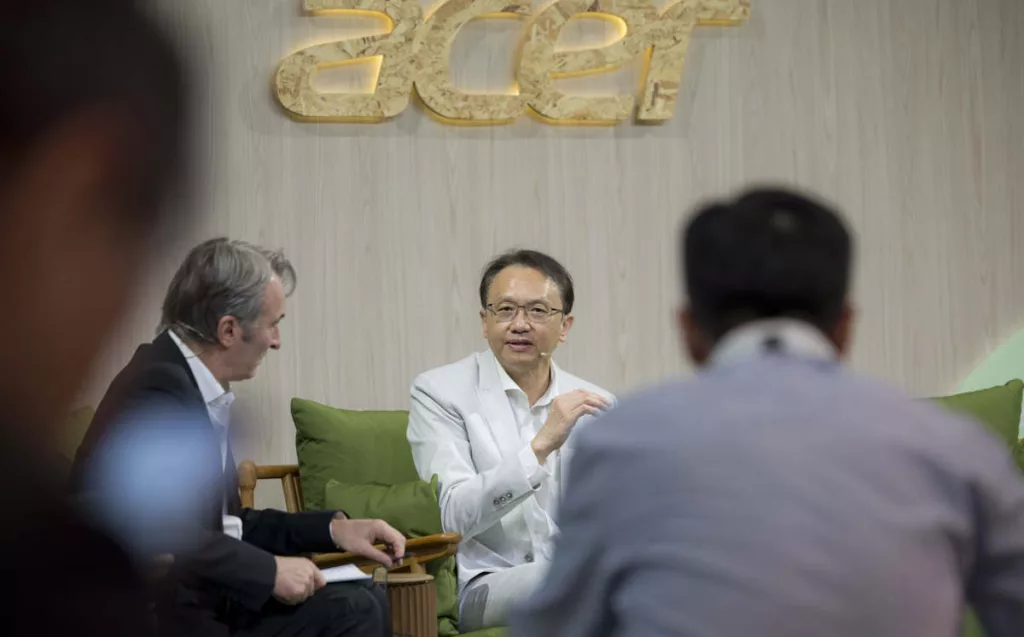
How Acer Conscious Technology is leading the way for green PC manufacturers
Table Of Contents−
Acer’s CEO Jason Chen took to the stage in Dubai last week to talk about the next stage in the company’s evolution. The concept is called Conscious Technology, and the plan is to expand Acer’s reach beyond PC manufacturing, with sustainability and climate-focused goals baked into its core. It also launched a bunch of new eco-friendly products, including solar panels and batteries.
However, being green is more complicated than looking green. Despite many eco-friendly innovations, from Acer and its rivals, the technology industry remains culpable for the fastest-growing waste stream on the planet.
So here’s my question. Can Acer’s CEO deliver a new eco-friendly strategy or is it just a mirage in the desert of Dubai’s oil fields? Here, I will explain the many things that Acer is doing right. And I will also act as a “critical friend”. I run a computer repair shop with my wife Alison, and I know first-hand that repairing Acer laptops isn’t always straightforward.

Related reading: Is Logitech a green and sustainable company?
Acer: honest about the green challenges
Within Acer’s slick opening video (and trust me, I speak as a former TV producer), where various members of management are wheeled before a camera to deliver eco-friendly platitudes, was this fascinating comment by Acer’s Chief Operating Officer, Jerry Kao:
“I think everyone feels tense about what is earth is going to become if we don’t do anything, but to be honest, our KPIs had nothing to do with green, so what should we do?”
The simple honesty of this admission is a rare thing within the ESG (environmental, social and corporate governance) of many tech corporations. Acer’s admittance and reference to the uncomfortable truth that it recently had zero climate performance indicators is an encouraging sign that Jason Chen’s announcement may have candour.
What is Acer’s Conscious Technology?
Acer’s Conscious Technology concept signifies an evolutionary development where the company plans to develop solutions beyond computing whilst becoming, as Chen proudly announces, “a climate era organisation”. Conscious Technology is built around four principles:
- Working centres around providing more sustainable PCs (like Acer Vero) with recycled materials, carbon neutrality, and end-of-life management.
- Learning focuses on education by not only making PCs sold in the education sector more durable and repairable but also aims to train students how to self-repair their products.
- Moving sees Acer expand its offering by using its hardware and software expertise in e-scooters, e-bikes and e-mobility hubs enhanced by AI capabilities.
- Living is the development of Acer’s thermal expertise to develop innovative air/water purifiers with the aim of targeting the solar and home energy storage sectors.
These are ambitious targets with an environmental focus and Acer was also keen to drop in additional eco headlines. It has committed to using 20% to 30% of PCR (post-consumer recycled) plastic in all computers and displays by 2025 and the new range of Acer Vero laptops will use 60% PCR. The new generation Vera 16in will also be carbon neutral.

Related reading: How to choose a solar generator – Buyer’s Guide
The carbon neutral challenge
The reality is that any product can be classified as carbon neutral if the manufacturer purchases enough carbon credits to offset the production emission. Some environmental groups view this as a flaw which devalues the standard as a measurement of impact.
What gives Acer’s declaration credibility is that its Corporate VP, Emmanuel Fromont, told the audience that the company will achieve its neutrality through active reduction of its carbon footprint and the rest from purchasing carbon credits. Environmentally, this is still far from ideal, but new research from Forest Trends’ Ecosystem Marketplace shows that companies that engage in voluntary carbon market reduction will reduce their own emissions more rapidly than their peers.
Acer has stated that it intends to retire high-quality carbon credits to achieve carbon neutrality in the future, but the challenge of decarbonising tech manufacturing cannot be understated. Neutrality on one laptop model is a sign of intent, but achieving neutrality across the entire range is a colossal and complex endeavour. Acer will have to challenge and influence its entire supply chain if it is to relieve its reliance on carbon offsets with any meaningful rapidity.
Open ambition
However, Acer is not hiding its ambition deep within ESG reports. The company has become a member of RE100, a global corporate renewable energy initiative whose members must make a public commitment to secure 100% of their electricity from renewable sources.
Acer has committed to achieving 100% renewable electricity by 2035 and net-zero emissions by 2050. Acer’s obligation to RE100’s technical requirements will not only impact how it will achieve its targets but also how progress is reported and communicated to the public.
It’s heartening that Acer has joined a scheme that forces the company to make its ambitions known. Plus, RE100’s hand on the tiller should avoid the usual inaction of self-governance, where environmental pledges are as binding as Henry VIII’s wedding vows.
The “repair” word
43 minutes into Acer’s presentation was the word I was waiting to hear, “repair”.
Fromont claimed Acer has over 1,000 employees working in recycle and repair, a service it offers for itself and 40 other companies. Sadly, no detail was shared about what this looks like in real life, but the mention that repurposing, repair and re-use facilities exist is interesting.
Acer seems to be hinting at a closed-loop recycling system, which is eminently sensible for a global manufacturer. Re-use can dramatically reduce manufacturing costs, and emissions have a global impact on both upstream and downstream recycling.
Fromont spoke of two projects where Acer has trained students in self-repair, claiming to have put 50 to 70 pupils through an e-learning course on how to fix the tech in their schools. Acer claims these students can now fix 90% of their broken PCs within 48 hours, which is an impressive number, and if Acer can train schoolkids to fix PCs, it can train everyone.
Let’s talk spare parts
Having facilities and schemes like these will be a surprise to any Acer customer who has ever tried to obtain spare parts from the company. Try and buy a replacement screen or motherboard from Acer and you’ll find that the spare parts cupboard is off-limits to the public.
Frustratingly, a USP of Acer’s Vero is the use of standard screws to aid “repair or recycle” which should really be “repair and recycle” for any company serious about the process. Acer needs to move forward quickly, following the lead of its strategic partners, Google and Microsoft, who are already offering genuine spares for certain products via iFixit. Vero should be there too.
And Acer needs to expand the Working element of Conscious Technology to include the public, independent repairers and repair cafés that are deliberately starved of parts and resources by tech manufacturers.
Acer is clearly positioning itself to be the green choice in PCs. There were a few mentions of “modular design” dropped into the conversations, so possibly Acer is taking inspiration from Framework and has realised that it’s easier to repair a product which hasn’t been designed as a glued-together box of easily snappable cables. Let’s hope.

Acer Conscious Technology: reasons for optimism, areas to improve
I’m optimistic that Conscious Technology will see Acer moving towards a more sustainable offering. At this stage, there is little detail, but I hope and expect this information will come soon.
However, we need to stay honest. It’s clear from its Conscious Technology presentation that Acer wants to use its hard-earned skills to move into new sectors and develop additional income streams. Acer intends for us to buy our way to sustainability, to an extent at least, so the question becomes how to do so without adding to the piles of e-waste.
Some new purchases make sense. Home solar capture and e-scooters are exciting areas of Acer’s Conscious Technology ideology, but if Acer is to achieve its stated goals then it can’t all be about what’s new and what’s next. Tech companies who proclaim to care for the planet need to address what has gone before. For example, I’d love to know what Acer plans to do about the mountains of e-waste dumped in all corners of the world that bears its logo.
Tackling PC industry’s history of e-waste
Corporate reluctance to acknowledge the past was exemplified by a guest speaker who said: “If you look at the world today, we’re actually transitioning from personal responsibility to societal responsibility and graduating to a planet responsibility.”
Really? Is this the fault of societies? Did we ask you to make unrepairable and semi-disposable machines with artificially stunted lifecycles because of poor design decisions and tactical software shutdowns? I would appreciate a little more acknowledgement of historical corporate responsibility and a little less gaslighting of business buyers and consumers who weren’t responsible for any of the products created.
Critically, though, Acer has made a public declaration and signalled intent that it plans to move forward and become a more sustainable corporation. Over the next few years, we’ll get a clearer indication of its progress towards its ambitious goals as Conscious Technology makes roots deep within the company. If Acer succeeds, then hopefully it will inspire others to evolve into climate-era organisations.
NEXT UP

Andrew Kay, Director of Systems Engineering APJ at Illumio: “The most worrying development with ransomware is that it has evolved from simply stealing data to impacting IT availability”
Andrew Kay, Director of Systems Engineering APJ at Illumio, has 20 years’ experience helping organisations strengthen their cyber resilience. We interview him as part of our Threats series on cybersecurity.

The imperative of making a career in the data centre industry attractive
Adelle Desouza addresses the problem of an ageing workforce in the data centre industry as well as how to make it an attractive career for new generations

I don’t care who hacked the Ministry of Defence, I do care how they did it
We may never know who hacked the Ministry of Defence, says Davey Winder, but who cares? It’s how they did it that has real-life implications